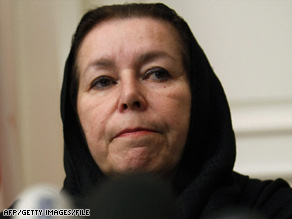The State Department called on Iran on Friday to pony up any information it has
on a former FBI agent who vanished there last year.

Christine Levinson, wife
of Robert Levinson, went to Tehran last year to try to learn her husband's fate.
State Department spokesman Sean McCormack urged Tehran to
share "any and all information" about Robert Levinson, who disappeared from
Iran's Kish Island over 19 months ago.
"The U.S. Department of State remains committed to
determining Mr. Levinson's whereabouts, and returning him safely to his family
that includes seven children, one grandchild and a second grandchild on the
way," McCormack said in a statement.
Senior administration officials say the United States is
increasing pressure on Iran to provide information on Levinson's whereabouts.
Several officials have said they suspect Iranian authorities are holding Levinson in a jail inside the country.
However, they stress they have no information confirming
their suspicions and have consistently voiced frustration with the lack of
developments in the case.
"Some people suspect he is being held by the Iranian
government, but nobody knows that for a fact, or we would be saying that," one
senior State Department official said. "We all agree the Iranians are not
putting forth 110 percent effort to find this man."
Levinson is a retired FBI agent from Coral Springs, Florida.
After leaving the agency, his wife says, he worked as a security consultant
specializing in cigarette smuggling.
Last week, Undersecretary for Political Affairs William
Burns, the State Department's third-ranking official, met with Levinson's
family, and earlier this fall, the State Department sent a diplomatic note to
Tehran through the Swiss government, which represents the U.S. interests in Iran
in the absence of an American diplomatic presence in the country.
In September, Christine Levinson flew to the United Nations in New York
to ask questions about her husband.
She sought a meeting with Iranian President Mahmoud
Ahmadinejad, who was at the United Nations for the U.N. General Assembly. But
Ahmadinejad declined to meet with her.
Last year, she traveled to Iran to try to retrace her
husband's steps. Back then, Iranian officials told her they would investigate
and report back to her. She still hasn't heard a word.
The State Department and FBI have denied he was working for
the government and has demanded that Iran free Levinson -- if it is holding
him.
Levinson says her husband suffers from diabetes and high
blood pressure and has offered a $5,000 reward for information leading to his
safe return.
Last year, CNN reported that Levinson met with Dawud
Salahuddin, an American fugitive who lives in Iran, shortly
before his disappearance.
Salahuddin -- known in Iran as Hassan Abdulrahman --
converted to Islam and was given refuge in Iran after admitting in interviews to
killing Ali Akbar Tabatabai, a former Iranian diplomat under the shah, in
Maryland in 1980.
Salahuddin said he was detained by Iranian officials in
plain clothes and taken away from the room he shared with Levinson to be
interrogated about his Iranian passport.
When he was freed the next day, he said, he was told by
officials that Levinson had returned to Dubai.
Senior administration officials have told CNN that they
think Salahuddin met with Levinson, but do not believe him to be a credible
source of information on Levinson's whereabouts.
McCormack said the State Department is trying to keep the
public aware of the case in the hopes of finding a fresh clue about Levinson's
whereabouts.
"We're always looking for ways to maybe break loose that
vital piece of information or the vital lead that may help us," McCormack
said.
He asked anyone with information about his
case to contact the State Department or the Levinson family via their Web site.




